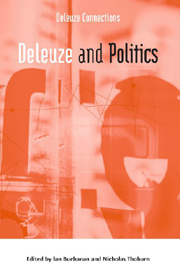Book contents
- Frontmatter
- Contents
- Dedication
- Acknowledgements
- Introduction: Deleuze and Politics
- 1 Power, Theory and Praxis
- 2 Deleuze and the Political Ontology of ‘The Friend’ (philos)
- 3 Molecular Revolutions: The Paradox of Politics in the Work of Gilles Deleuze
- 4 Schizoanalysis, Nomadology, Fascism
- 5 What is a Militant?
- 6 Bourgeois Thermodynamics
- 7 The Age of Cynicism: Deleuze and Guattari on the Production of Subjectivity in Capitalism
- 8 Deleuze, Materialism and Politics
- 9 Becoming-Democratic
- 10 Theorising European Ethnic Politics with Deleuze and Guattari
- 11 People and Fabulation
- 12 Micropolitical Associations
- Notes on Contributors
- Index
5 - What is a Militant?
Published online by Cambridge University Press: 12 September 2012
- Frontmatter
- Contents
- Dedication
- Acknowledgements
- Introduction: Deleuze and Politics
- 1 Power, Theory and Praxis
- 2 Deleuze and the Political Ontology of ‘The Friend’ (philos)
- 3 Molecular Revolutions: The Paradox of Politics in the Work of Gilles Deleuze
- 4 Schizoanalysis, Nomadology, Fascism
- 5 What is a Militant?
- 6 Bourgeois Thermodynamics
- 7 The Age of Cynicism: Deleuze and Guattari on the Production of Subjectivity in Capitalism
- 8 Deleuze, Materialism and Politics
- 9 Becoming-Democratic
- 10 Theorising European Ethnic Politics with Deleuze and Guattari
- 11 People and Fabulation
- 12 Micropolitical Associations
- Notes on Contributors
- Index
Summary
Félix Guattari's lament that there is ‘no description of the special characteristics of the working class that established the Paris Commune, no description of its creative imagination’ conveys a sense of his concern with the affective, imaginary and libidinal properties and dynamics of political subjectivation (Guattari 1984: 35). The history of the workers' movement, Guattari contends, is populated by ‘mutant’ workers in ‘veritable wars of subjectivity’ (Guattari 1996a: 124). He has in mind the events of revolutionary upheaval – the 1871 Commune, October 1917, May 1968 – but the problematic of revolutionary subjectivity is one that pervades modern socialist, communist and anarchist politics. This problematic is that of the ‘militant’, of ‘militancy’, a figure that persistently returns as the marker – indeed, often the self-declared guarantor – of radical subjectivity across the spectrum of extra-parliamentary politics. One can think of militancy as a technology of the self, an expression of the working on the self in the service of revolutionary change. However, unlike the subjective correlates of the great revolutionary events, for Guattari this more prosaic aspect of radical practice is not altogether joyful.
This paper is a critique of the militant. In particular it seeks to understand the ways militancy effectuates processes of political passion and a certain unworking or deterritorialisation of the self in relation to political organisations and the wider social environment within which militants would enact change. To this end the paper traces a diagram or abstract machine of militancy, a diagram comprised of Guattari's cartography of Leninism and the model of struggle set out by the Russian nihilist Sergei Nechaev.
- Type
- Chapter
- Information
- Deleuze and Politics , pp. 98 - 120Publisher: Edinburgh University PressPrint publication year: 2008

